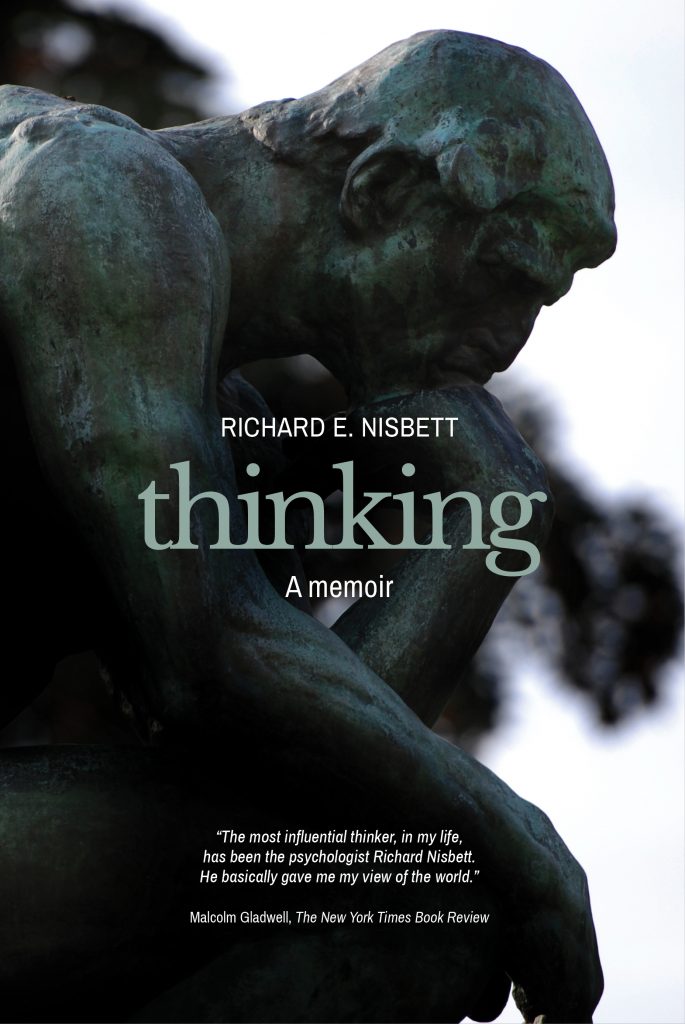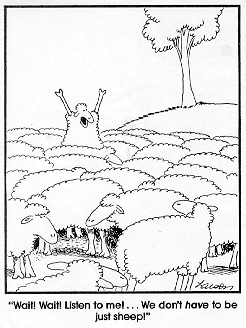My Interview with One of Psychology’s Most Influential Thinkers
This week, I’m excited to bring you something unique for Everyday Psych: a personal interview with one of psychology’s most esteemed and influential psychologists, Dr. Richard Nisbett.

Dr. Nisbett discovered some of the most interesting findings in social psychology, conducting research on people’s ability to introspect, on what ‘intelligence’ actually is, and how people from different cultures literally think differently. He has written multiple books, received psychology’s most prestigious awards, and has had his research cited thousands of times.
In this interview, I spoke with him about his latest book, Thinking: A Memoir, in which he provides both a personal history of social psychology as well as a broad examination of the way people reason. Below, are some excerpts from my interview with him, which discuss various elements of his book and show how insight from it can be used to improve your everyday life.
***
[Jake:] First, thank you for coming on board and having this interview. You’ve written a lot of books, The Geography of Thought, Mindware, so, to start, what prompted you to write this latest book?
[Dr. Nisbett:] Well, for one thing, I wanted to try to bring the research of psychology to a larger audience. But second, I wanted to write something that had the quality of literature. I wanted to write something you might want to read even if you didn’t know any psychologists.
I really appreciated that in your book, especially how you blended a discussion of your personal life with some of the key findings in the field. Could you discuss a little about how some of your own life experiences and the different culture shocks you faced influenced your research?

Well, certainly going from Texas to Boston at that time [as a first year college student]. I used to like to say I left Texas to go to college in a foreign country. The culture was so incredibly different. For example, one thing I learned in Massachusetts was that middle class people don’t kill one another like they do in Texas. I just kind of grew up thinking that was the sort of thing that happened. And learning that it was so different in the Northeast resonated with me for a long time, which eventually led me to study what I would call a ‘Culture of Honor.’
Could you say more about this?
Essentially the culture of honor is a socially adaptive response of Southern [U.S.] men to be more protective of their land and their livelihood, which means they get more upset and aggressive in response to threats to their reputation. There’s an expression in North Carolina from the 19th century or probably earlier: “Every man is sheriff on his own hearth.” Back in the day, Southerners often didn’t have a sheriff around, so they had to be more aggressive in defending themselves and their livelihood. Now, the South is left with this culture that there’s no reason for anymore – the sheriff is usually around – but the culture is still there. As a participant in that culture myself, moving to Boston helped me see these differences and conduct this research. Needless to say, I’ve never shot anyone myself.
(laughs) That’s good to hear. This interview would have taken a different turn if that weren’t the case. But speaking of turns, I’d like to talk to you now about some of your most cited research on people’s introspective blindness. You show time and again that people aren’t very good at explaining why they make the choices or decisions they do. Could you tell me a little bit about this research?

First, it takes a lot of work to convince people that they don’t have access to their introspective processes. In fact, when people ask me why I did something, I always warn them that anything I tell you might possibly be fabrication and bear no resemblance to the facts for why I really did it. You know, for a research example, if I have you hold a pencil in your mouth that forces you to smile, you’ll say a comic is funnier than if you weren’t doing this. But you’ll probably never tell me that this pencil-caused smile was the reason you found it funny. In fact, some participants will volunteer to punch you out if you told them that. But we know this act can in fact influence them. You know other examples: Why did you vote in favor of the education initiative? Did it have anything to do with the fact that you voted in a school? These invisible influences are massive, they’re happening all the time, and we’re not really aware of them. For people, then, it becomes tremendously important to state the process of what their reasoning was. Even if they’re not correct, it’s important to put a statement out there that can be criticized so we can find the real reasons that lead to a person’s behavior or choice.
I think that’s a really important point you’re making. Even if you’re wrong in trying to introspect on why you made a certain decision, it’s still valuable to deliberate on why you think you got to this conclusion and the process by which you got there. I’m curious if you have any insight on how to be better at introspection or if it’s just a foregone cause.
I think what’s important is to be aware of how wrong we can be – about what our reasoning was or the influences on our judgement. It takes a long time. It’s very difficult to get people to understand that. In the article where I and Tim [Wilson] made the argument that we have to assume that we don’t have direct access to our cognitive processes, it was a very long article. But it was needed. The whole impact of the article depended on fact after fact and domain after domain to be convincing that people are really not great at introspecting on the reasons behind their choices and behaviors.

I agree. It’s difficult to believe that we don’t have full control over our attitudes and behaviors, but the research is pretty clear on this. While discussing influences we don’t always have control over, another part of your book focuses on some of the common errors we make in our reasoning processes. In particular, you talk about the sunk cost fallacy, which we’ve discussed on this site. Could you talk about how we can keep people from making this error in their reasoning?
I think a single anecdote can have an impact on people. A single anecdote can plant the seed for why the hell am I doing this? Just to justify the money I spent? You know, people will go to a movie that they have bought tickets to even after learning it would be a terrible movie. Don’t waste your time. But people think, “Well I got to justify buying the ticket.” But I’d say you’re paying twice: once for the ticket and once for the tedium. Just pay once. You’re not getting your money back, so why force yourself to have an unpleasant experience in addition to losing the money?
This is good advice because you’re suggesting that people can learn and improve and get better at recognizing these cognitive biases.
You know, I used to hear: “Not only are we stupid but there’s no way to make us smarter.” So I started doing research to see if I could change the way people think. I was astonished, in 20 minutes you can teach people the sunk cost fallacy. And we know that they’ve learned it because in a totally different context, they’ll give a totally different response than those who haven’t learned about it. There’s nothing I’ve been involved in that was more important than the following which is that you can teach all this stuff. You can teach the Law of Large Numbers, how to understand correlation, the cost benefit principles, all the kinds of probabilistic reasoning errors that people make. You can teach it and people will learn. And you can get through to them – and a lot more if you give them a couple anecdotes. But nobody seems to know this. So spread the word.
(laughs) I’m trying. That’s what we’re trying to do here at Everyday Psych. To give those concrete examples that show how learning these principles can improve everyday life. And that’s what I think your book does a good job of doing, too.
Well thank you. I hope people find it valuable.
***
To learn more about these psychological principles and many of the stories behind their discovery, check out Dr. Nisbett’s new book, Thinking: A Memoir.

About Dr. Nisbett: Richard E. Nisbett is one of the world’s most respected psychologists. His work focuses on issues in social psychology and cognitive science. He has received the Award for Distinguished Scientific Contributions from the American Psychological Association and many other national and international awards. He is a member of the National Academy of Sciences and the American Academy of Arts and Sciences and is a recipient of the John Simon Guggenheim Fellowship. His book The Geography of Thought: How Asians and Westerners Think Differently . . . and Why won the William James Award of the American Psychological Association. That book, as well as Intelligence and How to Get It: Why Schools and Cultures Count and Mindware: Tools for Smart Thinking have been translated into multiple languages. His newest book is Thinking: A Memoir. To learn more, go to RichardNisbett.com







